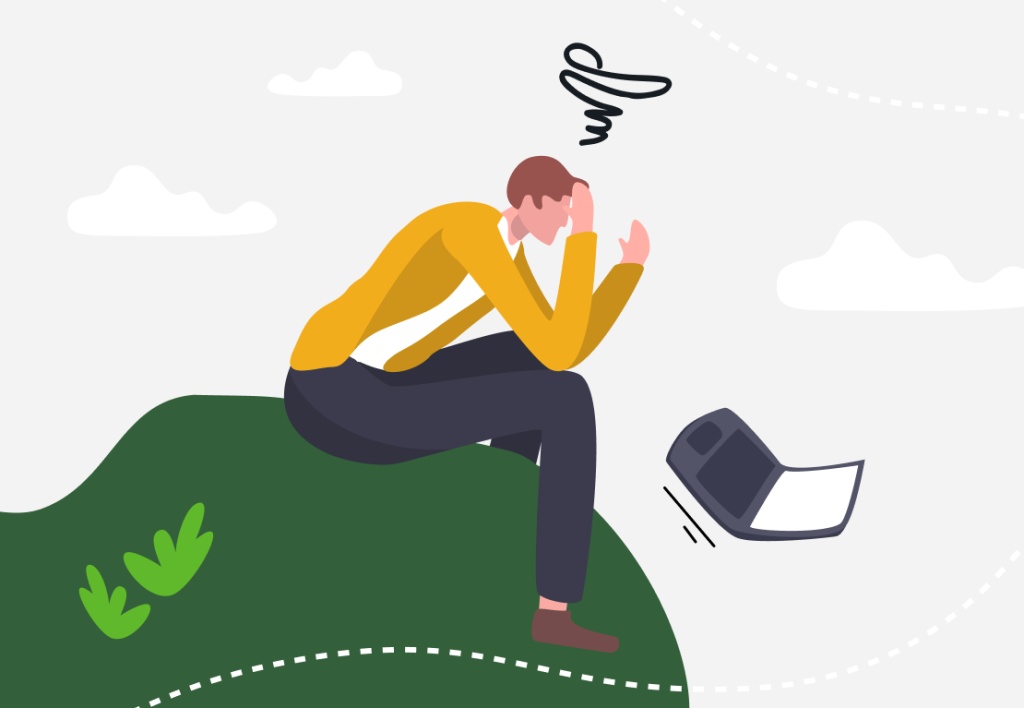How to deal with productivity dysmorphia

Productivity dysmorphia is a condition characterized by an unhealthy attitude toward productivity. It can involve thinking that one is never doing enough (despite contrary evidence), having unfounded fears about being confronted about one’s performance, constantly comparing one’s productivity to that of others – or simply trying to do too much all at once.
You might be familiar with the term dysmorphia, more specifically, body dysmorphia – it’s when one worries too much about their physical appearance, thinking that certain aspects of it are flawed. It can be a very upsetting experience, and the person dealing with it might spend a considerable amount of time obsessing over and trying to fix minor or even imaginary issues. Productivity dysmorphia, its work world counterpart, can be no less debilitating.
At first glance, productivity dysmorphia might appear harmless or even advantageous. You are striving to do more, you are never content with what you have achieved – it almost sounds like a winning formula. Don’t make that mistake – in the long term, it’s going to make you miserable.
Want to get the most out of your time?
Try DeskTime for free!
Try free for 14 days · No credit card required.
By signing up, you agree to our terms and privacy policy.

What does productivity dysmorphia feel like?
Imagine that you are going for a long hike. It’s a hot, sultry day, and you are carrying a heavy backpack.
Towards the evening, after covering many miles, you feel tired. It’s time to call it a day, pitch your tent, and rest. You will need your strength tomorrow, your muscles are aching, and you know you will fall asleep instantly the moment you lie down.
You would achieve nothing by pushing on – even if you think you could have covered more ground that day. You have reached your limit, plain and simple.
But you don’t stop because your productivity dysmorphia compels you to carry on through the night despite exhaustion. The next day, you realize that you haven’t gone much further, and you are actually in a worse position to carry on because you are so tired.
It’s a lose-lose kind of situation.

The dark side of productivity
Many of us aspire to be productive, and for a good reason – the idea is that productivity is the key to accomplishing our goals and leads to success. There is nothing wrong with this basic proposition – it’s a laudable aspiration to be productive.
However, the concept can sometimes become twisted in our highly competitive work world. When all you can think about is productivity, and it has become an endless treadmill of self-castigation, you know you have a problem.
How does one become afflicted with productivity dysmorphia?
Perhaps, for some people, it can be traced back to their strict parents, for whom “good” was never good enough. Sometimes it can be connected to the work culture – it’s probably more prevalent in competitive industries, which attract talented and hard-working people. If you are an entrepreneur, you are probably at higher risk, too – the increased responsibility might tempt you to adopt unhealthy productivity habits.
We can think of productivity dysmorphia as a nasty side effect of our contemporary work culture. It’s hard work but devoid of a crucial element – the ability to actually acknowledge and enjoy the fruits of it.
This begs the question – what would a healthy attitude toward productivity look like?
- It would mean acknowledgment of productivity as a vital ingredient of any successful endeavor – for which you can take credit and after which you deserve a rest.
- It would mean accepting that there are limits – at some point, the workday ends, and you have to turn off the lights.
- It means listening to people around you – if they say you have done a great job, there is usually no reason to dispute that.
Sometimes productivity is not the be-all and end-all of work. There might be unproductive days, which have to be accepted as such – humans are not machines that can constantly perform at a high level – and to be fair, we recognize that even machines have to be properly maintained.

Want to prevent overworking?
Prioritize and set healthy boundaries!
Coming to terms with productivity dysmorphia
Unfortunately, in the work context, it’s sometimes hard to recognize your limits. At the end of a tiring workday, it might be tempting to finish just that last email (and then another…). You might have answered dozens that day, but you still feel like a slacker for some reason.
Sometimes we are not the best judges of ourselves – we are so immersed in work that we don’t see the big picture. No one invites productivity dysmorphia willingly – we often recognize it only when it’s too late, and we are already suffering the consequences.
Here are some tips on how to identify and deal with productivity dysmorphia:
1. Acknowledge feedback
If you are doing great, it will not go unnoticed. If you are constantly receiving positive feedback from your colleagues, managers, and clients, it’s a clear sign that you are putting in enough work.
Don’t get caught up in your own head – acknowledge positive feedback as a sign that you are doing your best. Feedback can act as positive reinforcement by letting you recognize your efforts. Don’t ignore it, and make sure to reciprocate if you think someone has done a great job – these small gestures can do wonders.

2. Use to-do lists
To-do lists are routinely touted as one of the best ways to manage workload and boost productivity. In addition to that, if you utilize them smartly, you can avoid some of the pitfalls associated with productivity dysmorphia.
To-do lists can help you objectively acknowledge how much you have accomplished – you may think you have been slacking, but the crossed-out tasks will tell another story. It’s not a bad idea to make a habit of recording all your tasks. That way, you will have solid evidence of your accomplishments, and as a result, you will be less inclined to question your productivity.
3. Recognize your limits
We are all humans – we don’t have unlimited work capacity. We certainly enjoy stories about superhuman feats and accomplishments, but for most of us, the reality is a rather modest affair. We get tired and bored, and sometimes, a productive day might mean just getting out of bed.
Don’t get the wrong idea – we can and should aspire to be as productive as possible, but at some point, you are going to hit the ceiling. Push forward, and you might end up stressed and on the verge of burnout.
Be realistic and acknowledge that your capabilities are limited. In the long term, you are not doing anyone any favors by running yourself into the ground. When faced with overwhelming issues at work, remember that sometimes a viable strategy is to retreat to fight another day.

Concluding remarks
The contemporary work culture is all about productivity. If you are not doing your best, competition will leave you in the dust. However, we should be careful about extolling this virtue too much – some people may find themselves in a situation where they think nothing is ever enough.
Productivity should be assessed in a realistic way – it’s a limited human resource. If we demand too much from ourselves or others, sooner or later we will have to deal with the fallout.
Productivity dysmorphia invites a host of potential issues down the line, such as stress, burnout, and mental health issues. If you recognize yourself, your colleague, or your employee in this article, it’s time to think about how to remedy the situation.
Did you find this article useful? Give it a clap!
Psst! You can clap more than once if you really loved it 🙂